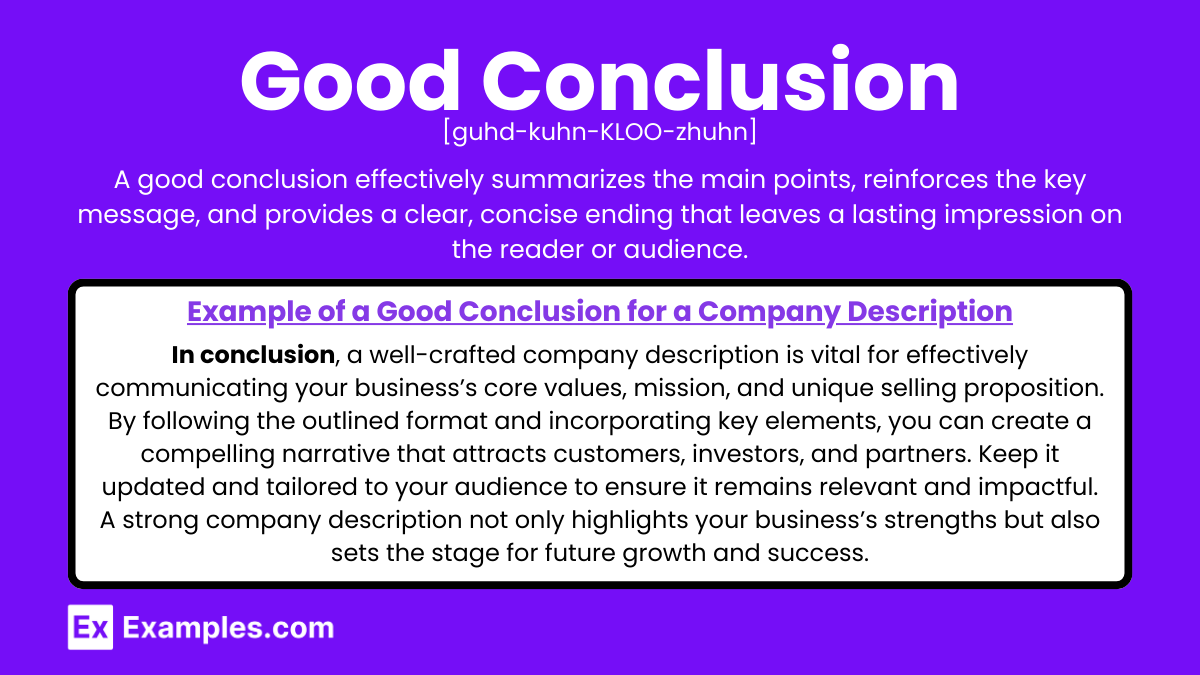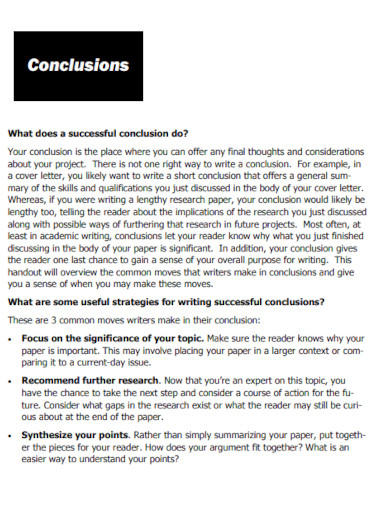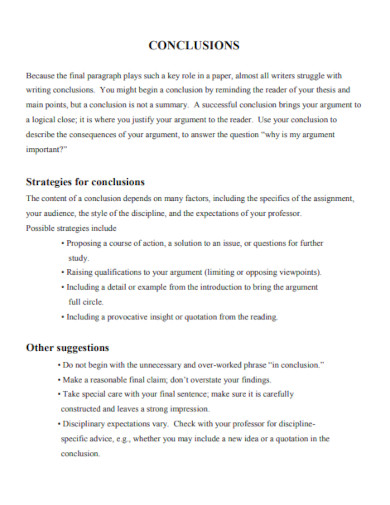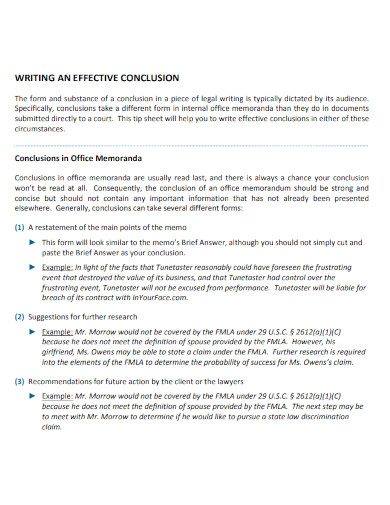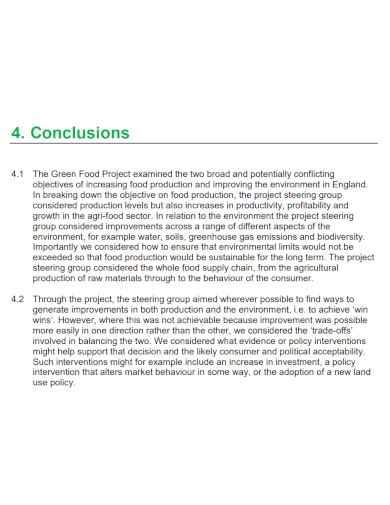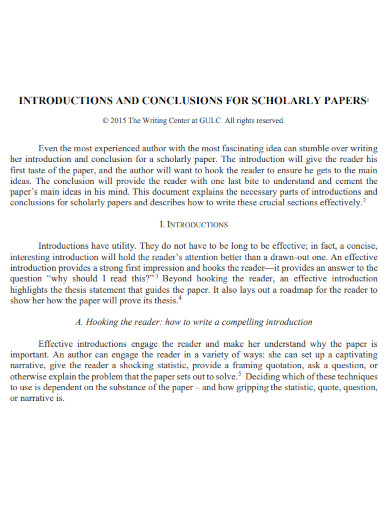Good Conclusion
As writers, we strive to engage our readers and leave a lasting impact on them. One crucial element of achieving this is crafting a strong conclusion. A good conclusion serves as the final chance to drive home the main points, provide a sense of closure, and leave a lasting impression on the reader. In this article, we will delve into what constitutes a good conclusion, the step-by-step guide to writing one, and explore some examples to help you master this essential skill.
What is a Good Conclusion?
A good conclusion effectively wraps up an essay by summarizing the main points, restating the thesis in a new way, and providing a final thought or call to action. It should give the reader a sense of closure and leave a lasting impression. A good conclusion connects back to the introduction, uses concise language, and avoids introducing new information.
Examples of Good Conclusion for Essays
Writing a strong conclusion helps to effectively wrap up your essay and leaves a lasting impression on your reader. Here are a few examples of good conclusions for different types of essays:
1. Persuasive Essay Conclusion
Topic: The Importance of Renewable Energy
In conclusion, transitioning to renewable energy sources is not just an option but a necessity. The evidence is clear: fossil fuels are depleting, and their continued use poses a grave threat to our environment. By investing in renewable energy, we can ensure a sustainable future, reduce greenhouse gas emissions, and create a cleaner, healthier planet for generations to come. The time to act is now; we owe it to ourselves and to future generations to embrace renewable energy and pave the way for a brighter, greener future.
2. Analytical Essay Conclusion
Topic: The Symbolism in “The Great Gatsby”
In conclusion, F. Scott Fitzgerald’s “The Great Gatsby” is a profound exploration of the American Dream’s complexities and pitfalls. Through the use of symbolism, Fitzgerald highlights the illusion of wealth and the moral decay hidden behind the facade of opulence. The green light at the end of Daisy’s dock, the eyes of Dr. T.J. Eckleburg, and the Valley of Ashes all serve to underscore the novel’s central themes. Ultimately, “The Great Gatsby” serves as a cautionary tale about the dangers of obsession and the hollow pursuit of material success.
3. Expository Essay Conclusion
Topic: The Impact of Social Media on Society
In conclusion, social media has transformed the way we communicate, connect, and interact with the world around us. While it offers numerous benefits, such as instant communication and access to information, it also poses significant challenges, including privacy concerns and the spread of misinformation. By understanding both the positive and negative impacts of social media, we can better navigate its complexities and harness its potential for good. It is crucial for individuals and society to use social media responsibly and thoughtfully to maximize its benefits while minimizing its drawbacks.
4. Narrative Essay Conclusion
Topic: A Life-Changing Experience
In conclusion, the summer I spent volunteering at the local animal shelter changed my life in ways I never imagined. It taught me the value of compassion, the importance of community, and the profound impact of small acts of kindness. The relationships I formed with the animals and the people I met have left an indelible mark on my heart. This experience has not only shaped my perspective but has also inspired me to continue giving back to my community. Sometimes, it’s the unexpected moments that teach us the most valuable lessons.
5. Argumentative Essay Conclusion
Topic: The Benefits of a Plant-Based Diet
In conclusion, adopting a plant-based diet offers numerous benefits for personal health, the environment, and animal welfare. The research is conclusive: a diet rich in fruits, vegetables, and whole grains can reduce the risk of chronic diseases, lower our carbon footprint, and prevent animal cruelty. While making the transition may require effort and adjustment, the rewards are well worth it. By choosing a plant-based diet, we take a powerful step towards a healthier, more sustainable, and compassionate world.
Examples of Good Conclusion for Informative Essay
A strong conclusion for an informative essay summarizes the key points, reinforces the importance of the topic, and leaves the reader with a final thought or call to action. Here are a few examples of good conclusions for different informative essay topics:
1. Conclusion on the Importance of Recycling
In conclusion, recycling is a crucial practice that benefits both the environment and the economy. By reusing materials, we reduce the need for raw resources, decrease pollution, and conserve energy. The evidence clearly shows that communities with robust recycling programs experience significant environmental and financial gains. As individuals, we can contribute by being mindful of our waste and actively participating in recycling initiatives. Together, we can make a significant impact and move towards a more sustainable future.
2. Conclusion on the History of the Internet
In conclusion, the internet has revolutionized the way we live, work, and communicate. From its early days as a military project to its current status as a global network, the internet’s development has been marked by rapid innovation and expansion. Understanding its history helps us appreciate the technological advancements and societal changes it has brought about. As we move forward, it is essential to continue fostering an open and accessible internet that can adapt to future challenges and opportunities.
3. Conclusion on the Benefits of Regular Exercise
In conclusion, regular exercise is vital for maintaining physical and mental health. It helps prevent chronic diseases, boosts mood, and improves overall quality of life. Incorporating physical activity into our daily routine can lead to long-term health benefits and a more active lifestyle. Whether it’s through sports, gym workouts, or simple activities like walking, making exercise a priority is a step towards a healthier and happier life. Let’s commit to staying active and reaping the numerous benefits of regular exercise.
4. Conclusion on the Effects of Global Warming
In conclusion, global warming is an urgent issue that requires immediate attention and action. The rising temperatures, melting ice caps, and increasing frequency of extreme weather events are clear indicators of its impact. Addressing global warming involves both individual efforts and collective action on a global scale. By reducing our carbon footprint, supporting renewable energy sources, and advocating for environmental policies, we can mitigate the effects of global warming and protect our planet for future generations. The time to act is now.
5. Conclusion on the Role of Technology in Education
In conclusion, technology has transformed education by enhancing learning experiences, providing access to vast resources, and enabling personalized instruction. The integration of digital tools in the classroom has made education more interactive and engaging for students. However, it is essential to address challenges such as digital divide and ensure that all students have access to technology. By leveraging the power of technology responsibly, we can create a more inclusive and effective educational environment that prepares students for the future.
Examples of Good Conclusion for Argumentative Essay
A strong conclusion for an argumentative essay should restate the thesis, summarize the main points, and leave the reader with a lasting impression or call to action. Here are a few examples of good conclusions for different argumentative essay topics:
1. Conclusion on the Legalization of Marijuana
In conclusion, the legalization of marijuana presents numerous benefits, including medical advantages, economic growth, and the reduction of crime rates. By regulating marijuana like alcohol, we can ensure safe use while reaping substantial tax revenues. The evidence clearly supports that the benefits outweigh the risks, making a compelling case for nationwide legalization. It is time for lawmakers to listen to the growing body of research and public opinion, and to take action towards a more rational and just drug policy.
2. Conclusion on the Death Penalty
In conclusion, the death penalty is an inhumane and ineffective form of punishment that fails to deter crime more effectively than life imprisonment. The risk of executing innocent people and the high costs associated with capital punishment further highlight its flaws. Society should focus on restorative justice and rehabilitation rather than retribution. Abolishing the death penalty would be a significant step towards a more ethical and equitable justice system.
3. Conclusion on School Uniforms
In conclusion, mandatory school uniforms are a beneficial policy that promotes equality, reduces distractions, and fosters a sense of community within schools. By leveling the playing field, uniforms can help eliminate social pressure and bullying based on appearance. While some argue that uniforms suppress individuality, the advantages in creating a focused and respectful learning environment are substantial. Schools should adopt uniform policies to enhance the educational experience for all students.
4. Conclusion on Climate Change Action
In conclusion, urgent action on climate change is imperative to prevent catastrophic environmental, economic, and social consequences. The overwhelming scientific consensus confirms that human activities are driving global warming, necessitating immediate and sustained efforts to reduce carbon emissions. Investing in renewable energy, implementing strict environmental regulations, and promoting sustainable practices are crucial steps. It is the responsibility of individuals, businesses, and governments to act now to safeguard our planet for future generations.
5. Conclusion on Animal Testing
In conclusion, animal testing is an outdated and unethical practice that should be replaced with more humane and scientifically advanced alternatives. Modern methods such as in vitro testing and computer modeling provide more accurate and humane options for scientific research. The suffering inflicted on animals cannot be justified when viable alternatives exist. It is time for the scientific community and regulatory agencies to embrace these alternatives and put an end to animal testing.
Examples of Good Conclusion for Persuasive Essay
A strong conclusion for a persuasive essay should restate the thesis, summarize the main arguments, and leave the reader with a compelling final thought or call to action. Here are a few examples of good conclusions for different persuasive essay topics:
1. Conclusion on the Importance of Recycling
In conclusion, recycling is not just an environmental responsibility but a necessary action for the sustainability of our planet. By reducing waste, conserving natural resources, and decreasing pollution, recycling plays a crucial role in protecting our environment. The evidence is overwhelming: communities that prioritize recycling see significant economic and environmental benefits. It’s time for all of us to commit to recycling and encourage others to do the same. Together, we can make a meaningful difference for future generations.
2. Conclusion on the Benefits of a Plant-Based Diet
In conclusion, adopting a plant-based diet offers numerous health benefits, environmental advantages, and ethical improvements. Research shows that a diet rich in fruits, vegetables, and whole grains can reduce the risk of chronic diseases, lower our carbon footprint, and prevent animal suffering. Making the switch to a plant-based diet may require some adjustment, but the positive impacts are well worth it. Let’s embrace this healthier, more sustainable way of living for ourselves and for the planet.
3. Conclusion on the Necessity of School Uniforms
In conclusion, implementing school uniforms is a beneficial policy that fosters equality, reduces distractions, and enhances school spirit. Uniforms help to eliminate socioeconomic disparities and create a focused learning environment. While some may argue that uniforms suppress individuality, the overall advantages they provide in promoting discipline and unity are undeniable. Schools should adopt uniform policies to create a more inclusive and productive educational experience for all students.
4. Conclusion on the Importance of Voting
In conclusion, voting is a fundamental right and a crucial duty of every citizen in a democracy. It is through voting that we can influence government policies, hold leaders accountable, and shape the future of our society. The power of a single vote can determine the outcome of elections and drive meaningful change. Therefore, it is essential for everyone to participate in the electoral process and make their voices heard. Let’s honor our democratic responsibilities and ensure a better future by voting in every election.
5. Conclusion on the Dangers of Smoking
In conclusion, smoking poses severe health risks and has detrimental effects on both individuals and society. The link between smoking and diseases such as cancer, heart disease, and respiratory issues is well-documented. Quitting smoking not only improves personal health but also reduces healthcare costs and increases productivity. It is imperative for smokers to seek help and for society to support anti-smoking initiatives. By working together, we can reduce the prevalence of smoking and create a healthier, smoke-free world.
Examples of Good Conclusion for Research Paper
A strong conclusion for a research paper should restate the main findings, summarize the significance of the research, and suggest possible implications or future research directions. Here are a few examples of good conclusions for different research paper topics:
1. Conclusion on the Impact of Climate Change
In conclusion, this research underscores the profound impact of climate change on global ecosystems and human societies. The data reveals a consistent trend of rising temperatures, more frequent extreme weather events, and significant disruptions to natural habitats. These findings highlight the urgent need for comprehensive climate policies and global cooperation to mitigate the effects of climate change. Future research should focus on developing adaptive strategies and exploring innovative technologies to address this pressing issue. Only through concerted efforts can we hope to safeguard our planet for future generations.
2. Conclusion on the Effects of Social Media on Mental Health
In conclusion, the study illustrates a complex relationship between social media use and mental health. While social media can foster connections and provide support, excessive use is linked to increased feelings of anxiety, depression, and loneliness. These findings emphasize the importance of promoting balanced and mindful use of social media. Future research should explore intervention strategies to mitigate the negative impacts and further investigate the long-term effects of social media on mental health. By understanding these dynamics, we can better support individuals in navigating the digital age.
3. Conclusion on Renewable Energy Adoption
In conclusion, this research highlights the significant benefits and challenges associated with the adoption of renewable energy sources. The transition to renewables offers substantial environmental advantages, including reduced greenhouse gas emissions and decreased reliance on fossil fuels. However, economic and infrastructural barriers must be addressed to facilitate widespread adoption. Policymakers should prioritize investment in renewable energy infrastructure and create incentives to encourage both consumers and businesses to transition to cleaner energy options. Future research should focus on developing cost-effective technologies and strategies to overcome these barriers.
4. Conclusion on the Role of Artificial Intelligence in Healthcare
In conclusion, the research demonstrates the transformative potential of artificial intelligence (AI) in healthcare. AI technologies can enhance diagnostic accuracy, personalize treatment plans, and improve patient outcomes. However, ethical considerations, data privacy concerns, and the need for rigorous validation of AI tools remain critical challenges. To fully realize the benefits of AI in healthcare, stakeholders must collaborate to address these issues and ensure that AI applications are both effective and equitable. Future research should explore the integration of AI with existing healthcare systems and its long-term impact on patient care.
5. Conclusion on the Economic Impact of E-commerce
In conclusion, the study reveals the profound economic impact of e-commerce on global markets. E-commerce has revolutionized retail by increasing accessibility, reducing costs, and driving innovation. The findings suggest that businesses must adapt to this digital shift by enhancing their online presence and leveraging data analytics to understand consumer behavior. Policymakers should support e-commerce growth through favorable regulations and infrastructure development. Future research should investigate the evolving trends in e-commerce and their implications for traditional retail models.
Examples of Good Conclusions for Speech
A strong conclusion for a speech should restate the main points, leave a lasting impression, and call the audience to action or reflection. Here are a few examples of good conclusions for different types of speeches:
1. Conclusion for a Motivational Speech
In conclusion, each of us has the power to overcome obstacles and achieve our dreams. We’ve explored the importance of perseverance, the value of setting goals, and the impact of maintaining a positive mindset. Remember, challenges are opportunities in disguise, and your determination can turn dreams into reality. Let’s embrace our potential, support each other, and strive for greatness every day. Together, we can create a future filled with success and fulfillment. Now, go out there and make it happen!
2. Conclusion for an Informative Speech
In conclusion, renewable energy is not just an option but a necessity for a sustainable future. We have examined the benefits of solar, wind, and hydro power, and their potential to reduce our carbon footprint. By investing in renewable energy, we can combat climate change, create jobs, and ensure a cleaner environment for future generations. It’s crucial that we continue to educate ourselves and advocate for policies that support renewable energy development. Let’s take the first step today by committing to a more sustainable lifestyle.
3. Conclusion for a Persuasive Speech
In conclusion, adopting a plant-based diet is a powerful way to improve our health, protect the environment, and reduce animal suffering. We’ve discussed the numerous benefits, from lower risks of chronic diseases to a smaller ecological footprint. I urge you to consider the impact of your dietary choices and make a conscious effort to incorporate more plant-based meals into your diet. Small changes can lead to significant benefits for both you and the planet. Let’s work together to create a healthier, more compassionate world.
4. Conclusion for a Ceremonial Speech
In conclusion, as we celebrate this milestone, let’s take a moment to reflect on our journey and the hard work that brought us here. We’ve faced challenges, learned valuable lessons, and grown stronger together. As we move forward, let’s carry the spirit of determination and unity with us. Congratulations to each one of you on this remarkable achievement. May your future be filled with success, joy, and endless possibilities. Here’s to new beginnings and the exciting adventures that await!
5. Conclusion for an Inspirational Speech
In conclusion, the power of kindness and compassion cannot be overstated. Through our actions, we have the ability to make a positive difference in the lives of others and create a ripple effect of goodwill. We’ve shared stories of remarkable individuals who have transformed their communities through simple acts of kindness. Let these stories inspire you to spread kindness in your daily life. Remember, a small gesture can have a profound impact. Let’s commit to making the world a better place, one act of kindness at a time.
Examples of Good Conclusion for Project
A strong conclusion for a project should summarize the key findings, emphasize the significance of the work, and suggest possible future directions or applications. Here are a few examples of good conclusions for different types of projects:
1. Conclusion for a Science Project
In conclusion, this project successfully demonstrated the effect of different fertilizers on plant growth. The data showed that organic fertilizers, such as compost, resulted in healthier and faster-growing plants compared to chemical fertilizers. These findings suggest that organic fertilizers are a more sustainable and eco-friendly option for promoting plant growth. Future research could explore the long-term effects of these fertilizers on soil health and productivity. This project highlights the importance of sustainable agricultural practices for a healthier environment.
2. Conclusion for a Business Project
In conclusion, our market analysis project has provided valuable insights into consumer behavior and preferences within the tech industry. The research indicates a growing demand for innovative and user-friendly products, with a particular emphasis on sustainability. By leveraging these insights, our company can tailor its product development and marketing strategies to meet the evolving needs of our target audience. Moving forward, it will be crucial to continuously monitor market trends and adapt our approaches accordingly to maintain a competitive edge.
3. Conclusion for an Environmental Project
In conclusion, this project has underscored the critical importance of wetland conservation. Wetlands play a vital role in maintaining biodiversity, regulating water cycles, and providing habitat for numerous species. Our findings highlight the significant impact of human activities on wetland degradation and the urgent need for protective measures. Implementing conservation strategies, such as creating protected areas and restoring degraded wetlands, will be essential for preserving these ecosystems. Future efforts should focus on raising public awareness and fostering collaboration between stakeholders to ensure the long-term sustainability of wetlands.
4. Conclusion for a Technology Project
In conclusion, the development of our mobile application has successfully addressed the need for a user-friendly platform to manage personal finances. The app’s features, including budgeting tools, expense tracking, and financial planning resources, have received positive feedback from test users. This project demonstrates the potential of technology to simplify financial management and empower individuals to make informed decisions. Future enhancements could include integrating AI for personalized financial advice and expanding the app’s accessibility features. The success of this project highlights the importance of continuous innovation in the tech industry.
5. Conclusion for a Community Service Project
In conclusion, our community service project has made a meaningful impact on the local homeless population by providing essential resources and support. Through collaboration with local shelters and volunteers, we distributed food, clothing, and hygiene kits, while also offering job placement assistance and mental health services. The positive feedback from recipients and the increased awareness within the community underscore the project’s success. To sustain these efforts, it will be important to secure ongoing funding and engage more community members in volunteer activities. This project has demonstrated the power of collective action in addressing social issues and improving lives.
More Good Conclusion Templates & Samples in PDF
1. Conclusion Research Paper Template
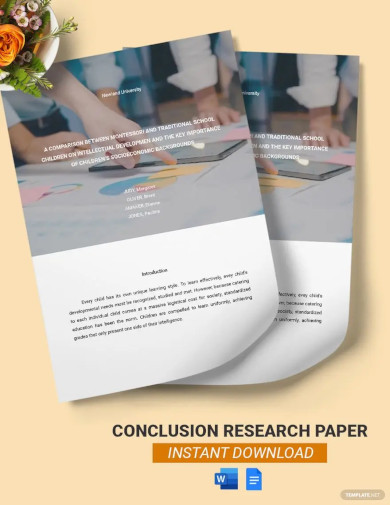
2. Conclusion Sample
3. College Conclusion
4. Conclusion Drafting
5. Food Conclusion
6. Conclusions for Scholarly Papers
Characteristics of a Good Conclusion
A good conclusion is crucial in writing as it provides closure to the reader while reinforcing the main points of the text. Here are the key characteristics that define an effective conclusion:
1. Restates the Thesis
A strong conclusion should restate the thesis statement in a fresh way, reinforcing the main argument without simply repeating it verbatim.
2. Summarizes Key Points
The conclusion should summarize the key points discussed in the body of the text. This helps the reader recall the main arguments and understand how they support the thesis.
3. Provides Closure
A good conclusion provides a sense of closure, leaving the reader with a clear understanding that the discussion has come to an end. It ties up loose ends and resolves any remaining questions or issues.
4. Reflects on the Significance
It should reflect on the significance of the topic, explaining why it matters. This could involve discussing the broader implications, the importance of the findings, or future directions for research or action.
5. Encourages Further Thought
An effective conclusion can encourage the reader to continue thinking about the topic. This could be through posing a question, suggesting further reading, or highlighting the relevance of the discussion to the reader’s own life or the wider world.
6. Avoids Introducing New Information
Introducing new information in the conclusion can confuse the reader. A good conclusion focuses on summarizing and reflecting on what has already been discussed rather than presenting new ideas.
7. Uses a Strong Closing Sentence
The last sentence of the conclusion should be strong and memorable. This could be a call to action, a poignant quote, or a thought-provoking statement that leaves a lasting impression on the reader.
8. Matches the Tone of the Essay
The conclusion should match the tone of the rest of the essay. Whether the tone is formal, informal, serious, or humorous, the conclusion should be consistent with the overall style of the text.
How to Write a Good Conclusion
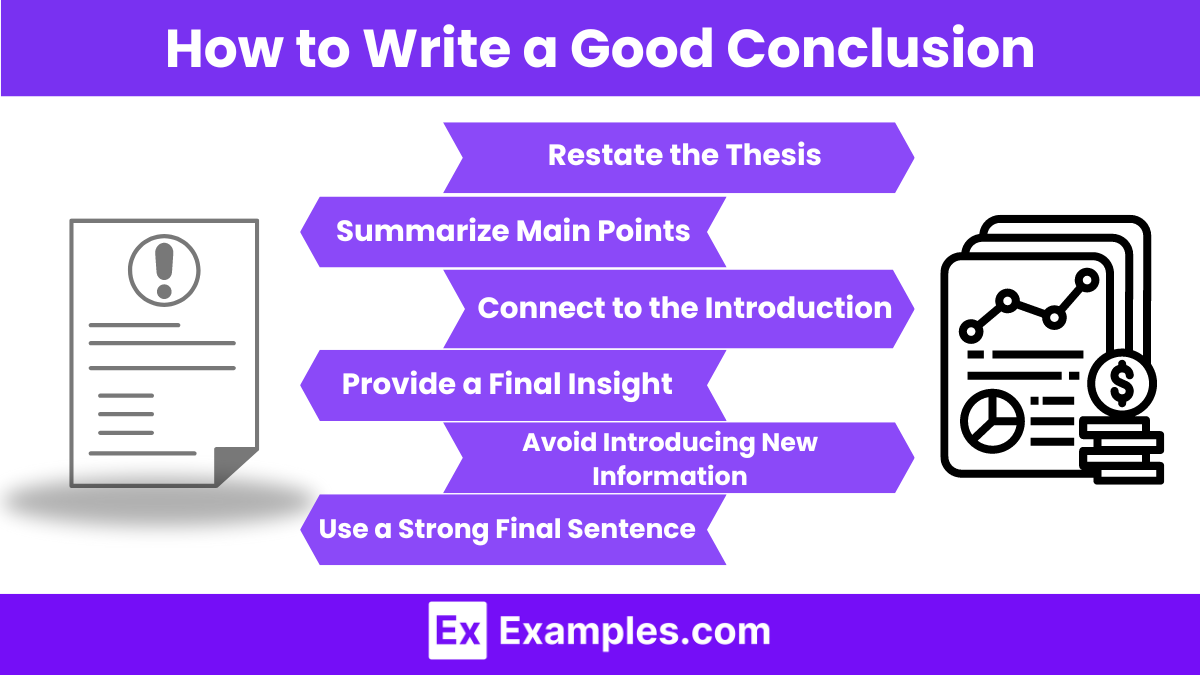
Writing a good conclusion is essential for wrapping up your essay or paper effectively. A strong conclusion not only summarizes the main points but also leaves a lasting impression on the reader. Here are the steps to write a good conclusion:
1. Restate the Thesis
Begin by restating your thesis statement in a new way. This reminds the reader of your main argument without repeating it word for word.
2. Summarize Main Points
Briefly summarize the key points you made in the body of your essay. This helps reinforce your argument and reminds the reader of the evidence you presented.
3. Connect to the Introduction
Link your conclusion to the introduction by revisiting a theme, anecdote, or idea you introduced at the beginning. This creates a sense of closure and completeness.
4. Provide a Final Insight
Offer a final thought or insight related to your topic. This could be a call to action, a prediction, or a reflection on the broader implications of your argument.
5. Avoid Introducing New Information
Ensure that you do not introduce any new arguments, evidence, or points in the conclusion. The conclusion is for wrapping up your existing points, not for presenting new ones.
6. Use a Strong Final Sentence
End with a powerful, memorable sentence. This could be a thought-provoking quote, a call to action, or a rhetorical question that leaves the reader thinking about your topic.
How should I start a conclusion?
Begin by restating your thesis in a new way to remind the reader of your main argument without repeating it verbatim.
Can I introduce new information in the conclusion?
No, avoid introducing new arguments or evidence. The conclusion is for wrapping up your existing points.
What is the purpose of a conclusion?
The purpose is to summarize the main points, reinforce the thesis, and leave a lasting impression on the reader.
How can I make my conclusion impactful?
Use a strong final sentence, such as a thought-provoking quote, a call to action, or a rhetorical question.
How long should a conclusion be?
A conclusion should be concise, typically around 5-7 sentences, summarizing key points without being overly detailed.
Should I restate all my main points in the conclusion?
Briefly summarize the key points, focusing on the most important ones that support your thesis.
Is it necessary to connect the conclusion to the introduction?
Yes, linking the conclusion to the introduction creates a sense of closure and completeness, reinforcing your main themes.
Can I include a call to action in my conclusion?
Yes, a call to action can be effective, especially in persuasive essays, to encourage the reader to take specific steps.
What tone should I use in my conclusion?
Maintain a confident and clear tone, reinforcing your arguments and leaving a strong final impression on the reader.
How can I avoid a weak conclusion?
Avoid simply summarizing without adding any insight. Reinforce the significance of your argument and leave the reader with something to ponder.



